-
Catalyzing Action
To help governments, entrepreneurs, and civil society advance a global action plan to harness open data for development
-
Support to Governments
To support developing country governments to plan, execute, and manage national open data initiatives
-
Scale Effective Use
To increase re-use of open data in developing countries by supporting appropriate data standards, guidelines, solution-driven applications, and demand-side capacity, helping to bring about social and economic innovation
-
Monitor Impact
To better understand the relationship between open data initiatives and socioeconomic development, informing the quality and reach of future open data initiatives
-
Institutional Capacity
To build the institutional capacity and long-term sustainability of the OD4D network
Objective 3
Scale open data use and innovation in developing countries
Scaling Innovations
OD4D continues to build on previous work that prioritized standards, interoperability, open source platforms, effective licensing, and action research that documents learning on scaling. In 2017, OD4D is targeting investments in sectors with significant potential for social and economic impact. These areas have include open procurement and contracting, health, new research into gender methodologies, data journalism, anti-corruption, urban mobility, mobilizing new technologies to measure air quality, investigating data and agriculture, investing in resilient cities, and testing evidence-based models to provide better health to refugees, and scaling successful technologies.
Training Civil Society and Data Users
In 2017, OD4D has been experimenting with new models to train data users. Partners have explored a variety of models to deliver support. In Haiti, the Caribbean Open Institute and School of Data piloted a training module 300 young women on data-related skills, aiming to support their increased access to employment. In MENA, support for data journalism training aimed to help journalists use data in new and effective ways, as well as civil society. In Latin America, Gov Camps and roundtables have investigated new data standards. In Africa, they are testing the impact of embedded fellows who help build capacity in organizations, and in country led focal points who support additional work.
Objective 4
Monitoring Impact to understand the relationship between open data and development
The state of open data project
is an open and collaborative stock-taking exercise short summary articles that take stock of the open data landscape in particular communities, across the range of stakeholder groups, across different regions, or in light of key cross-cutting issues. The final edition, due in early 2019, will produce a flagship publication to serve as a core reference and as a stimulus for policymakers, practitioners, and researchers. It will build on OD4D (Open Data for Development) measurement tools that already examine both supply and demand for open data, and research that supports a growing number of communities across regions and sectors.
Supporting research uptake
Aiming to address language gaps and policy uptake, ILDA has development RIGA (Repositorio de Investigaciones Cuantitativa y Cualitativa sobre Innovaciones en Gobernanza) to share Spanish language findings of open data research.
Measuring what works
OD4D is supporting a special edition of the Open Data Barometer focusing on Africa that is nearing completion by the end of 2018. Similarly, CAFDO is aiming to ensure contextual materials are available for French language speakers.
Individual research
white papers, peer reviewed publications, and learning is being captured on diverse subjects such as AI, Right to Information, open data and health, combatting gender violence, capacity building, sensor data, costing and scalable business models, data journalism, pedagogy and more.
Open Data & Gender
OD4D has continued to prioritize support to innovation for gender equality and gender transformation. For instance, in Latin America, we have worked with the Organization of American States and governments in the region to help prevent and eliminate violence against women, catalysing actions to collect reliable data on domestic violence and women’s homicides.
MENAdata research will focus on analyzing the status of data and its levels of accessibility within the agricultural sector in Sudan, with a particular focus on women in the sector and the extent to which data on and for women, has been collected, managed or used in studies on the sector.
In partnership with the Government of Canada and the Open Government Partnership created the Feminist Open Government Initiative (FOGO), which seeks to build more evidence on how technology-enabled open government can lead to better governance. Open government processes that include anti-corruption, participatory budgeting, and other transparency and accountability initiatives have struggled to fully include women and other historically excluded groups due to a variety of power asymmetries. A significant portion of the initial work and consultations are being led by the OD4D network.
While the challenges around focus and capacity still exist, the renewed focus has resulted in significantly more activity, and we anticipate will lead to stronger outcomes heading into 2019/2020.
Challenges & Lessons learned
As a new phase of investments is completed, the Open Data for Development (OD4D) program will aim to build in stronger monitoring, evaluation and peer learning mechanisms into the projects for 2016-2020. OD4D will also draw strongly on the recommendations outline in the OD4D External Evaluation. These mechanisms will continue to include group calls, knowledge sharing, and efforts to build a broader community of practice – especially for people in the network who engage directly in developing countries.
Also, regional (and national) maturity and priorities differ significantly across the network, which can make collaboration more challenging. We are in the process of implementing a learning agenda and peer support forum to formalize collaborations between the hubs and the advisors.
Finally, we will continue to advance an evidence-based agenda for change, including supporting monitoring that better documents outcomes. The need for ongoing emphasis on knowledge translation, documenting learning, and communicating strategically with intent to influence core stakeholders and policy audiences, both as a network, and as individual actors and organizations.



